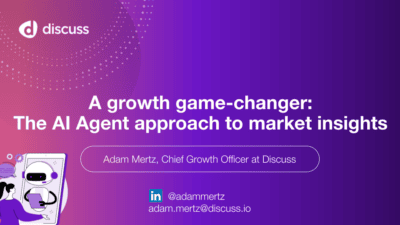Transforming Qualitative Research: The Power of Generative AI in Report Creation

Crafting detailed reports can often feel like a marathon—not just consuming time but also draining energy and mental clarity. Imagine spending hours sifting through data, then painstakingly piecing together insights only to worry about potential errors creeping in. Many professionals have endured this cycle until generative AI brought a revolutionary change.
By harnessing advanced algorithms and natural language processing, generative AI transforms mountains of raw data into coherent, insightful reports within minutes. For instance, platforms like Discuss utilize these technologies to rapidly summarize research findings with precision and clarity. This shift not only accelerates productivity but also boosts confidence in data-driven decisions—delving deeply into why this matter is our next step.
Generative AI revolutionizes report creation by automating repetitive tasks, generating tailored insights, and facilitating the synthesis of complex data. Through its ability to quickly analyze and structure information, generative AI empowers users to craft comprehensive and impactful reports efficiently.
Advantages of Generative AI in Report Creation
Generative AI revolutionizes how reports are generated. Traditionally, crafting reports involves sifting through vast amounts of data, selecting pertinent information, and then weaving it into a coherent narrative. This process can be time-consuming, often taking days or even weeks. However, generative AI turbocharges this process by leveraging natural language processing (NLP) and machine learning algorithms to swiftly analyze extensive datasets, extract valuable insights, and produce comprehensive reports in a fraction of the time it would take a human.
The beauty of generative AI lies in its ability to not only crunch numbers but also craft engaging narratives from the data. It harnesses patterns within the data to form compelling and insightful reports. Business leaders and decision-makers no longer need to wade through mountains of raw data to glean insights; instead, they are presented with clear, concise reports ready for consumption.
For example, platforms like Discuss, powered by generative AI, automatically summarize key findings from research data. These platforms distill complex data sets into actionable insights to quickly convey the essence of the information making comprehensive reports easier than ever. This capability enables businesses to swiftly interpret results and make informed decisions confidently, thereby enhancing market research efforts and facilitating product development.
So, the advantages are crystal clear: generative AI not only saves time but also ensures that reports are consistently accurate, insightful, and easy to understand—a significant asset in today’s fast-paced, data-driven business landscape.
In this age of data abundance and rapid decision-making cycles, the demand for increased efficiency and accuracy has never been more pressing. Let’s now explore how generative AI plays a key role in meeting these critical requirements.
Increased Efficiency and Accuracy
Generative AI has transformed the otherwise time-consuming process of report creation. Traditionally, data analysis and report drafting would take days of exhaustive work, meticulous organization, and extensive scrutiny. However, with the advent of AI-powered tools, this once labor-intensive task is now streamlined to occur within a matter of hours.
Imagine a scenario where an entire team is dedicated to meticulously analyzing data, crunching numbers, and compiling reports. Weeks go by as each team member dissects different sections of the data, cross-references figures, and meticulously combs through multiple drafts before finally producing a comprehensive report. Now, contrast that with generative AI: a tool capable of processing vast amounts of data at rapid speeds, quickly sifting through and interpreting complex datasets to extract key insights.
This level of automation not only reduces the hours invested in manual labor but also accelerates the decision-making process for businesses. With timely access to accurate data insights, organizations can pivot strategies swiftly, accelerating their competitive edge in the market. By empowering teams with more time for strategic thinking and decision-making, generative AI enhances overall organizational agility and responsiveness in ever-evolving market landscapes.
In addition to efficiency gains, generative AI is renowned for its unmatched accuracy in interpreting and presenting data. Human errors are common when it comes to manual data entry and analysis – even the most detail-oriented professionals are susceptible to making mistakes. However, with AI-driven platforms like Discuss, manual errors are significantly minimized through the automated interpretation of complex datasets.
Some may argue that relinquishing control to machines could lead to oversights or misinterpretations that may go unchecked in automated processes. But conversely, the risk of human bias or interpretation errors is far greater when compared to the consistent precision ensured by AI-driven platforms like Discuss’.
By leveraging generative AI’s ability to streamline processes and minimize human error, organizations are embracing higher levels of efficiency, accuracy, and trust in their decision-making efforts – all crucial components for long-term success in today’s rapidly changing business landscape.
Enhancing Business Operations with AI-Generated Reports
Imagine a world where AI-generated reports not only save time but also significantly enhance decision-making. With a profound grasp of your business’s data and trends, these reports are invaluable for driving intelligent, informed decisions.
Time-saving Integration: When we talk about saving time, it’s more than just an hour or two. It’s about allowing employees to focus on strategic tasks that truly propel the business forward. These AI-generated reports bear the burden of handling data, freeing up hours for your team to concentrate their attention where it’s most needed.
This isn’t merely a theory; studies have shown that businesses can save a substantial amount of time by integrating AI in their report generation process. In fact, AI-driven market research tools can generate insights up to 5 times faster than traditional methods.
Improved Decision-Making: Quick and accurate report generation is worth its weight in gold. Timely access to comprehensive data enables businesses to make well-informed decisions promptly. For instance, a company utilizing Discuss’ AI capabilities could swiftly respond to market trends and customer feedback, facilitating agility and quick adjustments to remain competitive in their industry.
Let’s take the example of a retail business needing immediate insight into customer preferences. By harnessing generative AI to rapidly compile and analyze customer feedback, real-time insights into purchasing behaviors are obtained, enabling swift adjustments to satisfy customers promptly.
Immediate Access to Crucial Information: Generative AI-powered reports offer critical insights at record speeds and organize data for better understanding of complex trends and patterns. This ability to quickly process data can mean the difference between staying ahead of the curve or falling behind due to delayed responses arising from slow data processing.
It’s evident that the impact of generative AI on business operations extends beyond time-saving — it fundamentally shapes how decisions are made, empowering companies to adapt quickly and effectively in rapidly changing environments.
The transformative power of AI doesn’t stop there; let’s now explore its capabilities in decision-making and content generation.
AI Capabilities in Decision-Making and Content Generation
When considering decision-making, the traditional image that comes to mind is of individuals analyzing data to find patterns and make choices. However, with generative AI, these processes have become more efficient and creative than ever before. Let’s explore how AI brings personalized insights and enhances creativity in report creation.
Personalized Insights
One of the most significant advantages of using generative AI for report creation is its ability to customize reports based on specific business needs and preferences. Whether it’s tailoring the level of detail, selecting key metrics, or highlighting relevant trends for a particular decision-maker, the AI ensures that the generated reports are highly personalized. This means decision-makers receive only the most crucial information aligned with their specific role and responsibilities within the organization.
For instance, if a senior executive needs a concise overview of financial performance to guide strategic planning, the generative AI can compile a comprehensive yet succinct report with critical KPIs, market trends, and other relevant data points. On the other hand, if a marketing manager requires detailed customer segmentation analysis, the AI can deliver an in-depth report focusing on consumer behavior patterns, regional preferences, and engagement metrics. This level of personalized insight generation not only saves time but also empowers decision-makers to make informed choices aligned with their specific focus areas.
Enhanced Creativity
Generative AI algorithms have redefined content creation by synthesizing information in novel ways that may be overlooked by human analysts. With its advanced natural language processing capabilities, Discuss’ generative AI goes beyond mundane data summaries and provides unique interpretations of complex datasets. By identifying hidden trends and extracting actionable recommendations, the AI adds a layer of creativity to report generation that is both insightful and forward-thinking.
This enhanced creativity manifests in various forms such as identifying unconventional correlations within datasets, uncovering emerging market opportunities, or suggesting innovative strategies based on predictive analysis. The ability of generative AI to connect disparate pieces of information and identify previously unseen patterns enriches the quality and depth of insights provided in reports.
Furthermore, generative AI amplifies creativity by producing cohesive narratives from disjointed datasets, transforming raw numbers into compelling and coherent stories. This storytelling approach not only captures attention but also facilitates better understanding and retention of complex data among decision-makers.
In essence, generative AI brings a new dimension to decision-making by offering tailored insights and fostering creative content generation that transcends traditional analytical boundaries.
As we continue our exploration of the capabilities of AI in report creation, let’s now shift our focus to the impact of advanced language models on business intelligence and strategic decision-making.
Real-World Applications of AI in Report Creation
When it comes to report creation, generative AI has proven to be a game-changer across various industries. Let’s explore some concrete examples of how AI is used to streamline and enhance the process of creating reports.
Case Studies
In retail, generative AI revolutionizes the way sales data is analyzed. Instead of spending hours sifting through sales and customer data manually, AI rapidly and accurately analyzes this information to produce reports highlighting best-selling products and customer preferences. This not only saves time but also provides valuable insights for retailers to optimize their product offerings and marketing strategies. Similarly, in financial services, AI is utilized for precise risk assessments and investment analysis. By leveraging advanced algorithms and predictive modeling, financial institutions can generate comprehensive reports that aid in making strategic and informed decisions. Across various sectors, clients of Discuss, including Edgewell Personal Care, have reported significant improvements in the speed and quality of their market research reports, showcasing the versatile applicability of AI in report creation.
How Generative AI Technology Works
Generative AI might sound complex, but it’s essentially a set of intelligent algorithms working together to comprehend and produce human-like text. At the heart of these algorithms are transformers—they’re like the brains of the operation. The more they practice, the better they become at understanding and generating various types of text, from paragraphs to in-depth reports.
To dive further into this, these models are trained on extensive datasets—think of it as a student preparing for an exam. The more books they read and notes they take, the better they’ll perform on the test. Similarly, AI models are fed vast amounts of information so they can excel at creating reports that are not just detailed but also highly adept at grasping the context.
Practical Implementation
Now, let’s examine how this functions in practical terms. Take a tool like Discuss for example—it enables users to input all kinds of raw data, which the AI then processes to produce detailed summaries, themes, and insights, giving you well-organized and informative reports. It’s akin to having an incredibly astute assistant who sifts through all the data and compiles everything you need in a structured and clear report. Moreover, as new data keeps coming in, the AI learns and becomes even more proficient at creating reports that precisely align with your requirements.
This adaptive learning capability is genuinely potent because it signifies that the generated reports are incessantly growing and enhancing, much like your business does.
By transforming raw data into clear and meaningful reports—and continually becoming more intelligent—generative AI has revolutionized the process of producing precise and impactful reports for businesses.
The remarkable capability of generative AI technology to learn and adapt is reshaping how businesses analyze data, creating unprecedented opportunities for innovation and efficiency. Explore how generative AI can transform your approach to report creation with Discuss.
Ready to unlock human-centric market insights?
Related Articles

How AI Agents are Redefining the Future of Market Insights
The world of artificial intelligence is moving at lightning speed, and the concept of AI agents has brought about the…
The world of artificial intelligence is moving at lightning speed, and the concept of AI agents has brought about the…

Part 3: Generative AI – Market Research Angel or Devil? How to ensure you win in this new era
By Adam Mertz, Chief Growth Officer at Discuss In part one of this blog series I spent time reviewing the…
By Adam Mertz, Chief Growth Officer at Discuss In part one of this blog series I spent time reviewing the…

Part 2: Generative AI – Market Research Angel or Devil? How to ensure you win in this new era
By Adam Mertz, Chief Growth Officer at Discuss In part 1 of this blog series, I focused on a lot…
By Adam Mertz, Chief Growth Officer at Discuss In part 1 of this blog series, I focused on a lot…



